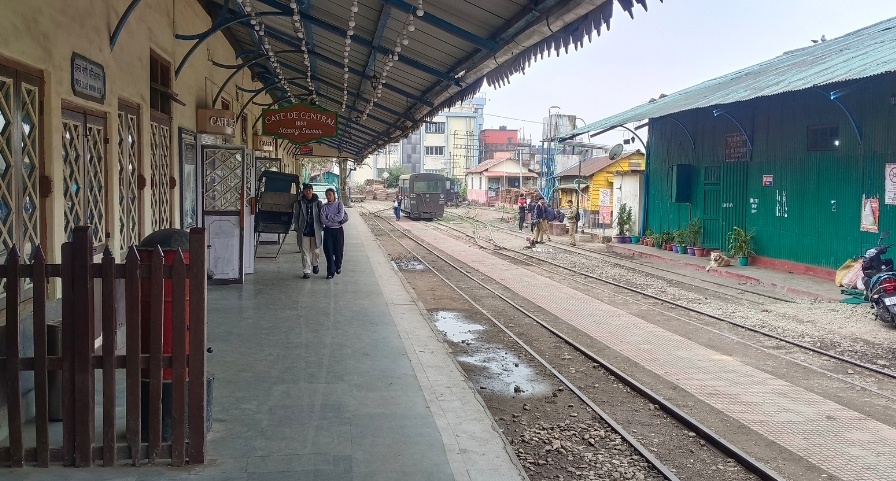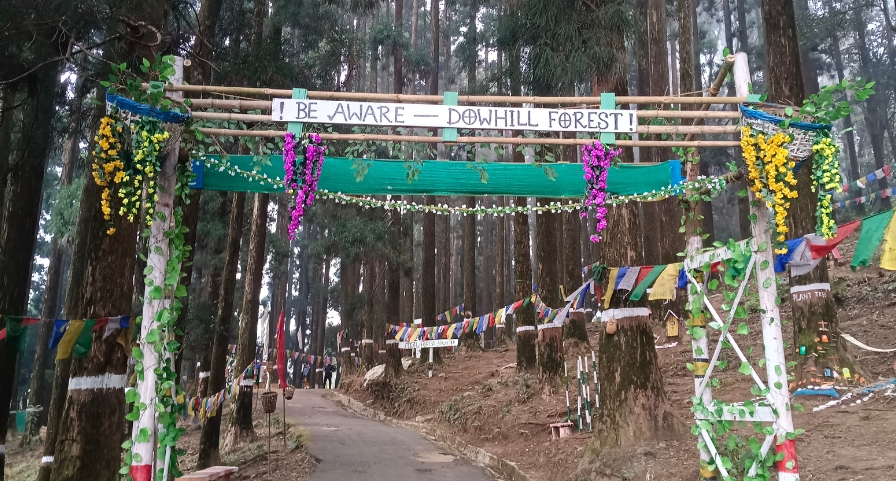Feroj Pakhrin has been selling momos (steamed dumplings) at Kurseong, a hilly town in Darjeeling district of West Bengal for the past two years.
The 47-year-old tells VillageSquare that business had been slow as his makeshift shop is located in an isolated corner in the hills where tourists hardly visit.
We found that the forest can provide ample opportunity for livelihood to locals who would also play an important role in its conservation.

But all that has changed with the inauguration of the Dow Hill eco-park around eight months ago. He now earns around Rs 60,000 per month thanks to the increase in the flow of tourists.
Also watch: A sacred forest of spirituality & tradition in Meghalaya
Livelihood opportunities
“I was working as a chef in Dubai and was earning around Rs 45,000 per month. I had to return home during the pandemic-induced lockdown and was jobless. I started a small eatery in the hills but there were hardly any tourists as the shop was in a desolate corner,” says Pakhrin.
“I couldn’t afford to pay high rent in the main town. The shop was running at a loss till a pine forest was turned into an eco-park, and opened to the public around eight months ago. It has changed my fortunes,” he adds.
The credit for transforming the pine forest into a commercial venture for attracting tourism and enhancing livelihood goes to a forest officer who realised that it could be helpful for the locals,
“We found that the forest can provide ample opportunity for livelihood to locals who would also play an important role in its conservation. We have successfully managed to create livelihood for those people who have returned to their homes with an aim to start something of their own,” says Sambarta Sadhu, range officer of the Kurseong range forest.
He adds that the forest is spread around 0.75 hectares and a nominal fee of Rs 20 is being charged to visitors. “We have set up a Joint Forest Management Committee (JFMC) where the earnings from ticket sales are being given to the locals who use the money in maintenance and beautification of the forest,” says Sadhu.
Mesmerising Kurseong
Nestled in the foothills of the Himalayas, Kurseong is a small hilly town that offers a perfect relief to outsiders due to its cool climate and also offers a slice of colonial architecture.

The hill station transports the outsider to the land of dreams with a small railway station glowing with bulb lights, a thick layer of clouds hovering over the green mountains and a wintery chill that soothes the soul.
Colonial imprints are still visible in this sleepy town in the form of lush tea gardens, and a toy train with steam engines that takes a brief halt while chugging from New Jalpaiguri railway station to Darjeeling, the British Chimney and the Victoria school.
The notable tea gardens include Makaibari, Ambotia, Castleton and Goomtee with some also offering a visit to their gardens, factories and tea-tasting sessions.
The British Chimney located in Chimeni hamlet, around 11 kilometres from Kurseong town is a major attraction among tourists. The structure is essentially a brick fireplace believed to have been part of the Dak bungalow that was built by the British in 1839 but crumbled over time leaving behind just the chimney.
Several tourists come here from across the country and even outside to visit the chimney and also the viewpoint located close to it, “We normally get around 100 tourists every day but their numbers swell during the peak season that begins in October and lasts till December. The chimney and the connecting park are maintained by the state government,” says Awesh Lama, an employee.
Also read: The first green village of India – Khonoma
Spooky presence
However, the unique and most sought-after destination by the tourists in Kurseong is Victoria Boy’s School at Dow Hill. It was founded in 1879 and is counted among the oldest schools in the country.

It has retained its colonial architecture and has an over 200-year-old church on its premises. But what drives tourists here is the numerous videos on social media that claim the school and its vicinity is haunted. The rumours have reached such an extent that Dow Hill is listed among the top 10 haunted places in the country in an internet search.
School officials, however, rubbished the rumours as baseless and misleading, “This is the handiwork of some mischievous people who uploaded the videos with eerie background sounds on social media to gain views. I have been working here for over two decades but have never witnessed any supernatural activity. Several students come here to study from different parts of the country and have never encountered anything spooky or unusual,” says Kamla Dewan (50), a cook in the school.
Paradise for tourists
The town also has Eagle’s Craig watchtower, and the Giddapahar view point to witness the majestic mountain Kanchenjunga, deer park, temples, museum and churches.
Bipendra Roy, 46, a taxi driver, however, conceded that he gets a brisk business as people come to visit Dow hill and other parts of the hilly town, saying, “The influx of the tourists has increased as people come from outside to enjoy the pleasant weather and also visit Dow hill which has numerous stories floating around.”
Besides, the town is an education hub with over 20 schools offering food and boarding facilities for students.
How to get there
Kurseong enjoys good air, road and rail connectivity with the rest of the country.

The nearest airport is Bagdogra around 38 kilometres away while the nearest railway station is New Jalpaiguri (NJP) located around 44 Kilometers away. Toy trains are also available from NJP to Kurseong along with government buses, private and shared vehicles.
The small town is a perfect place for those who want to relish their time with nature while getting a breather from the mundane activities of daily life.
Also read: A village tourism bucket list for art lovers
The lead photo at the top shows the pine tree forest in Kurseong’s Dow Hill which has been turned into an eco park for tourists. (Photo by Gurvinder Singh)
Gurvinder Singh is a journalist based in Kolkata.








